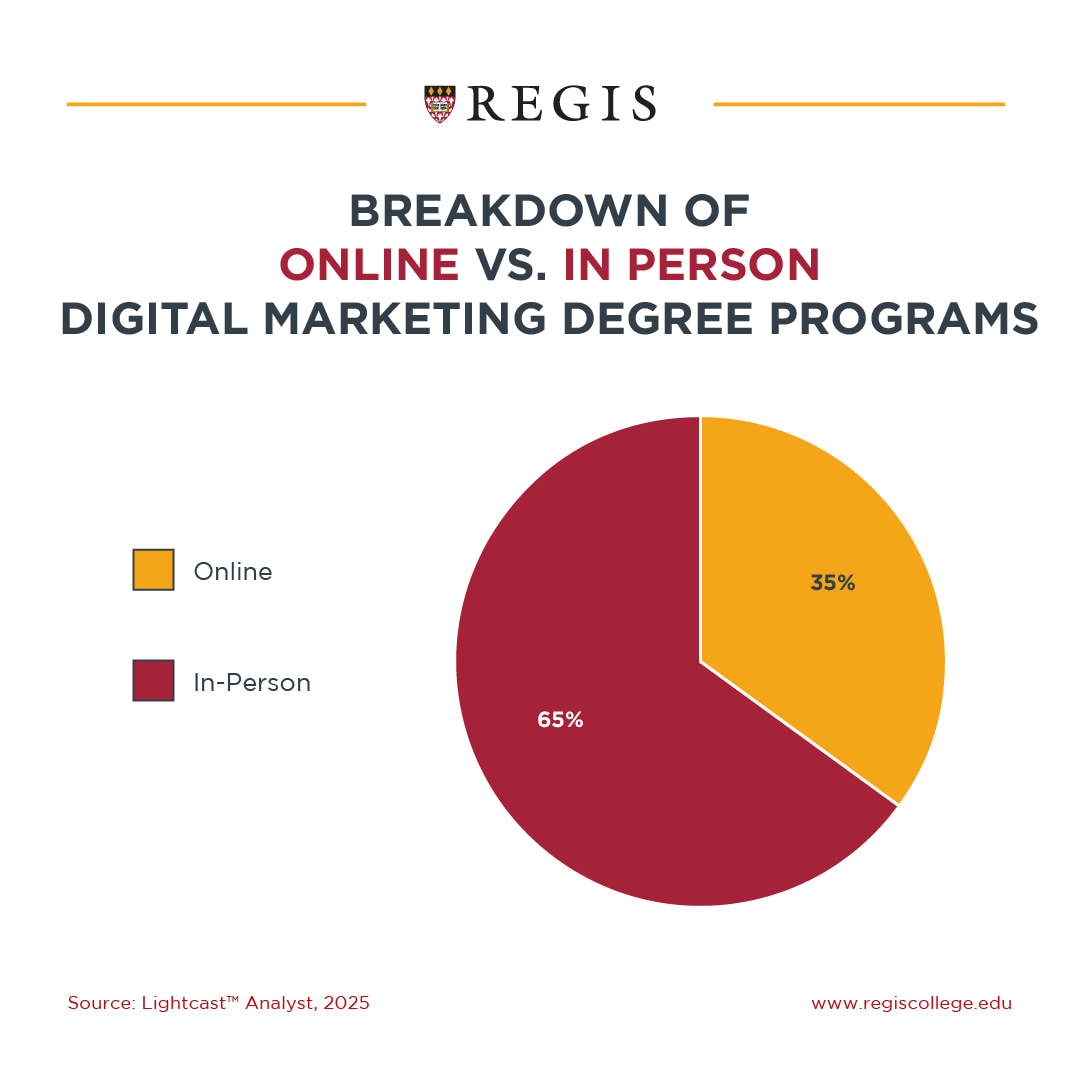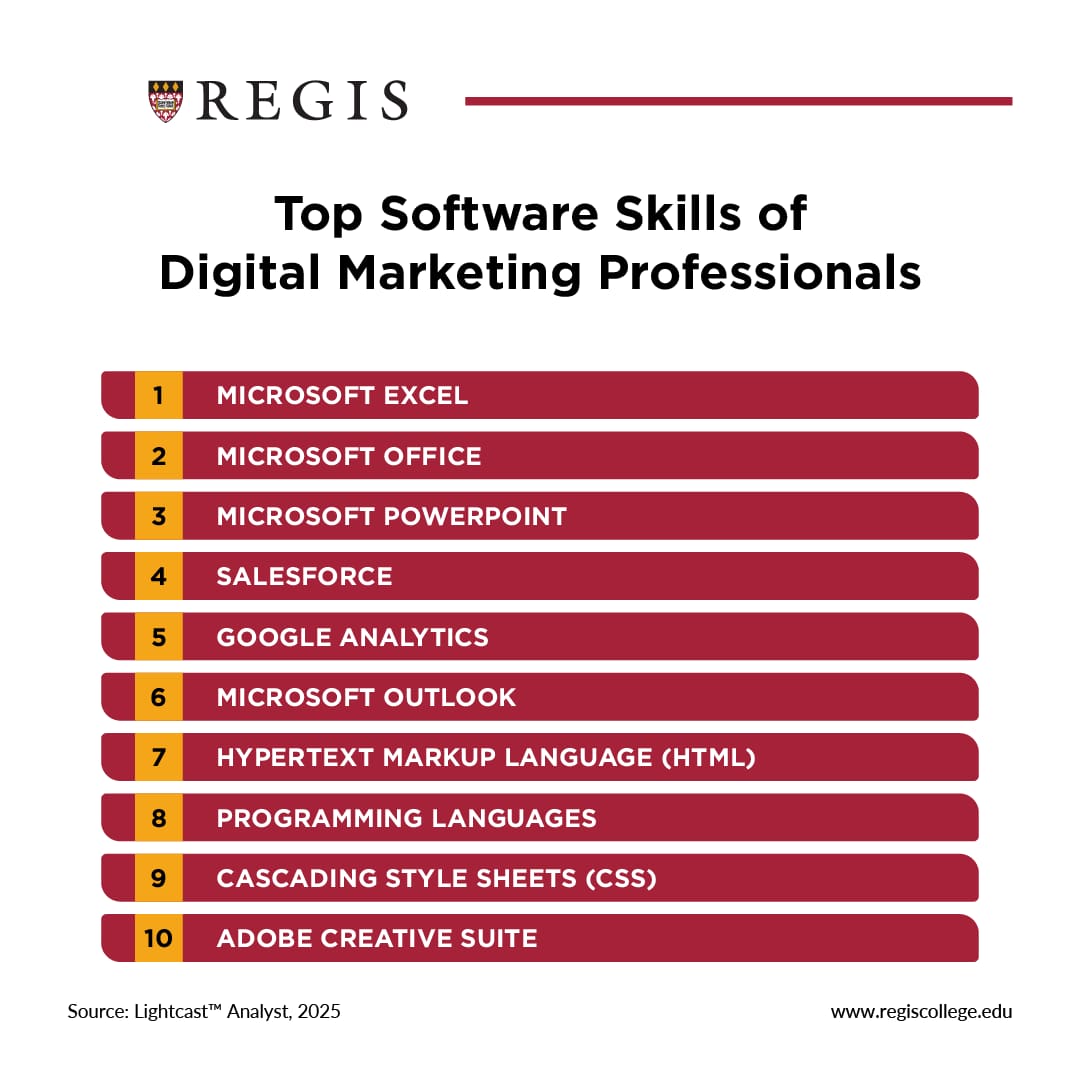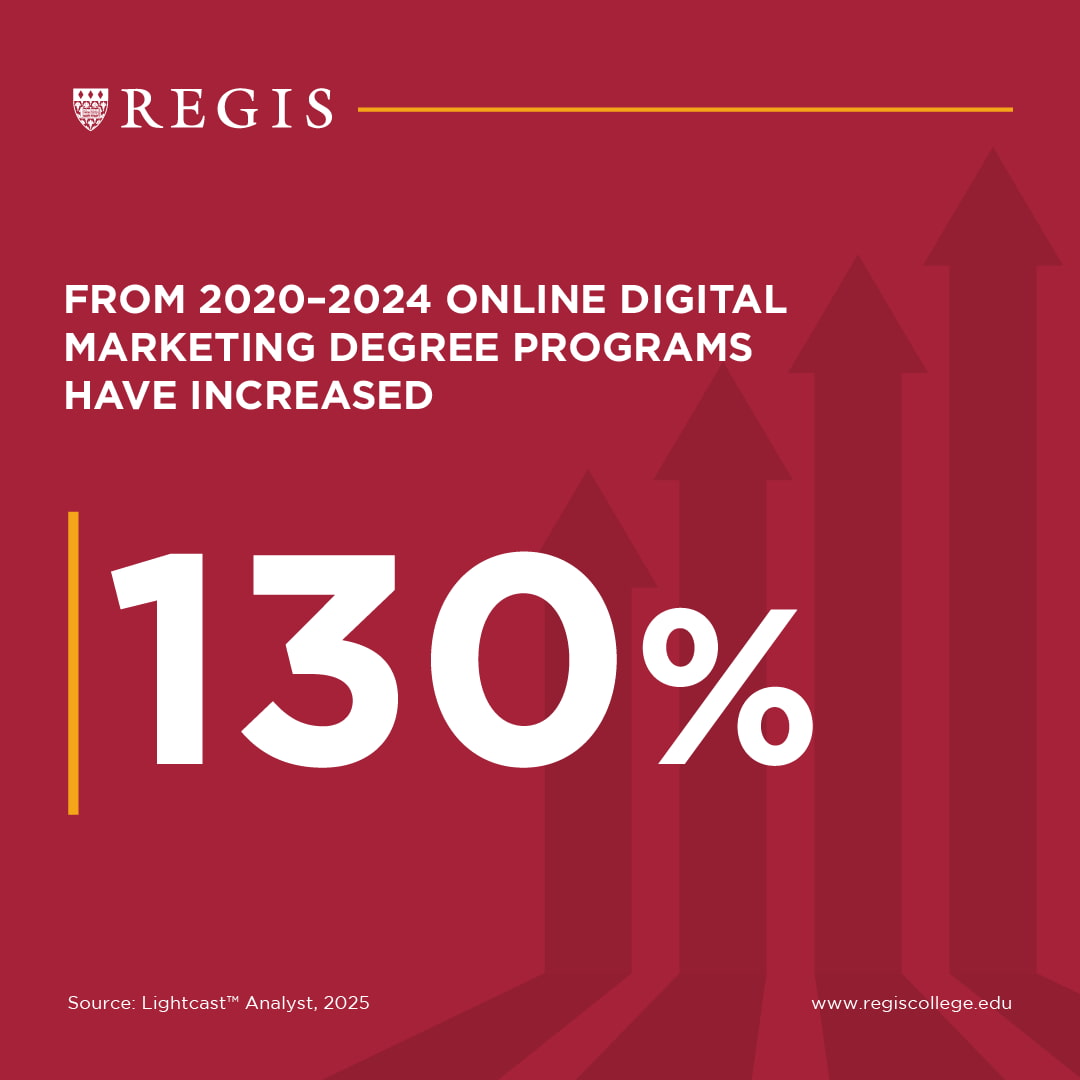Digital marketing plays a central role in how businesses grow and connect with customers. As a result, demand for skilled professionals continues to rise. And as this field has evolved, so has the way people are learning these in-demand skills. According to labor market data, 35 percent of digital marketing degree programs are now offered online—up from just five percent a few years ago.

This growth reflects a shift in how today’s learners approach education. For many, the ability to study on their own schedule makes it possible to build new skills without disrupting their careers or personal lives. Online programs also remove geographic barriers, offering access to expert faculty and industry professionals from anywhere. And with lower overhead costs than in-person options, they often provide a more affordable path to career advancement.
So whether you’re working full-time, managing other responsibilities, or simply need a more flexible approach, online learning makes it possible to upskill without putting life on hold. Here’s how to choose the best online digital marketing course for you.
Key Takeaways
- Clarifying your career goals—whether you're entering the field, changing careers, or aiming to specialize—can help you choose the right digital marketing program.
- Online programs vary in structure; some are self-paced while others are instructor-led. Understanding your learning style will help you select the right format.
- A strong digital marketing education should cover core strategy, offer specialization options, and include training in commonly used tools like Google Analytics, Salesforce, and Adobe Creative Suite.
- Programs with hands-on learning, experienced faculty, and career support services offer the greatest value and can better position you for long-term success.
How to Choose the Online Digital Marketing Course That’s Right For You
1. Define Your Goals
Before exploring what an online digital marketing education can offer, it’s important to understand what you’re hoping to get out of it. Are you just getting started in the field and need to build a strong foundation? Are you looking to expand your expertise in a specific area like analytics, paid media, or strategy? Or are you aiming to take the next step in your career?
Clarifying your goals will help you make more informed decisions about the type of education that fits your needs. Some learners may benefit from shorter, skill-specific programs that target a particular area of growth. Others may be ready for a more comprehensive and structured experience that supports long-term career development and provides more hands-on learning opportunities.
Your background and professional experience also matter. If you already have a foundation in marketing or communications, the right program should build on that, not repeat what you already know. And if you’re starting fresh, you’ll want a program that introduces core concepts in a way that’s approachable and actionable.
Either way, aligning your goals with the type of education you pursue is key to getting real value.
2. Look for Flexible Online Learning Formats
One of the biggest advantages of online education is flexibility, but not all programs offer it in the same way. If you’re balancing work, family, or other responsibilities, it’s important to find a digital marketing program that fits your life, not the other way around.
For example, some programs are self-paced, which allow you to move through the material on your own schedule. These are ideal if your availability shifts week to week or you prefer to work independently without fixed deadlines. On the other hand, instructor-led programs follow a more structured timeline with scheduled sessions, live discussions, and regular deadlines. These can be a great choice if you benefit from more accountability and interaction with faculty and classmates.
There’s no right or wrong format though. It’s about what works best for your learning style and lifestyle. When you look closely at how the coursework is delivered, whether there’s flexibility to adjust your pace, and how much support is available throughout the experience, you’re more likely to stay engaged and succeed.
3. Evaluate the Curriculum for Foundational and Specialized Skills
A strong digital marketing education should offer more than surface-level exposure to the field, it should prepare you with both the strategic foundation and technical skills needed to succeed in today’s competitive landscape.
Start by looking for a digital marketing curriculum that covers core marketing principles such as storytelling and branding, communication theory, and digital strategy. These foundational skills help you think critically about marketing challenges and apply proven frameworks to real-world scenarios. From there, a quality curriculum should expand into specialized areas like data analytics, content development, and performance measurement to give you the tools to plan, execute, and refine digital campaigns.
Equally important is the technical side of digital marketing. Today’s professionals are expected to be fluent in the platforms and tools that drive modern campaigns. According to recent job posting data, here are the top software skills employers look for:
- Microsoft Excel
- Microsoft Office
- Microsoft PowerPoint
- Salesforce
- Google Analytics
- Microsoft Outlook
- HyperText Markup Language (HTML)
- Programming Languages
- Cascading Style Sheets (CSS)
- Adobe Creative Suite

What sets many advanced programs apart though is the opportunity to tailor your learning to match your career goals. For instance, Regis College’s Online Master’s in Digital Marketing Communication offers specialized tracks in nonprofit communication and sports communication. These concentrations allow students to deepen their expertise in a specific area while still gaining a broad understanding of digital marketing. Even if you’re not sure which path to pursue, programs with optional tracks give you the flexibility to explore your interests and adapt your education as your goals evolve.
4. Prioritize Hands-On Learning
In digital marketing, theory only gets you so far. Employers want to see what you can actually do. This is why hands-on learning should be a key part of any online program you consider.
Look for a curriculum that goes beyond lectures and readings to include opportunities to apply your skills in real-world settings. This might mean developing live marketing campaigns, analyzing real data sets, or working through case studies that mirror challenges professionals face on the job. These experiences help you build confidence, develop your problem-solving abilities, and prepare for the fast-paced demands of the field.
Another important aspect is portfolio-building. The best programs will give you a chance to create tangible work, like campaigns, reports, strategy decks, or content plans. Some programs, like Regis’, take this a step further by offering internship opportunities or “internships-in-place”—customized projects that allow students to apply what they’ve learned within their current job or organization. This type of real-time application not only strengthens your resumé, but helps you make an immediate impact in your current role.
5. Research Faculty and Institutional Industry Knowledge
When evaluating an online digital marketing program, don’t overlook who’s doing the teaching. Faculty experience can make a big difference in how relevant and practical your education is.
So when you’re researching programs, look for a faculty composed of both academic experts and industry leaders. Faculty with academic backgrounds bring depth, structure, and a strategic lens to the material to help you understand the “why” behind core marketing concepts. Meanwhile, instructors who are currently working in the field can offer firsthand insights into how those concepts are applied in real-world scenarios.
This balance is especially valuable in digital marketing, where the gap between theory and practice can be wide. Learning from instructors with experience in digital agencies, Fortune 500 companies, e-commerce, or corporate marketing means you’ll gain relevant, career-focused knowledge that reflects the demands of today’s job market.
6. Consider Career Support
Earning a credential is important, but so is what comes next. As you evaluate online digital marketing programs, don’t overlook the support offered outside the classroom. The right career services can make a meaningful difference in how quickly and confidently you transition into your next role.
Some programs provide robust career support that includes resume building, interview coaching, and job search support tailored for digital marketing. These services can help you articulate your skills, highlight your portfolio, and stand out to employers in a competitive market.
Networking opportunities are another key benefit. Programs that connect you with industry leaders, alumni, and hiring partners can open doors and provide valuable insights into different career paths. In a relationship-driven field like marketing, these connections can be just as important as the credential itself.
According to recent labor market data, job postings for degree program graduates in marketing-related roles are projected to grow nearly nine percent from 2023 to 2029—a promising sign for those entering the field or aiming to advance. So choosing a program that actively supports your job search can really help you take full advantage of this momentum.
7. Compare Programs’ ROI
Investing in your education is a big decision, so it’s important to weigh the cost of a program against the value it can deliver in the long run. Not all online digital marketing programs offer the same return on investment, and understanding the potential outcomes can help you make a more informed choice.
Start by considering the career impact. Will completing the program position you for a promotion, salary increase, or new job opportunity? Some programs share data on the average salary boost graduates see or how quickly they’re able to secure a role in the field. This kind of information can offer insight into whether the investment is likely to pay off.
You’ll also want to look at job placement rates and the reputation of the institution within the marketing industry. Programs that are well-regarded by employers, include industry-recognized credentials, or have a track record of successful alumni can give you a competitive edge—both during your job search and as you grow in your career.
Find the Right Path Forward in Digital Marketing
Online digital marketing education can unlock new opportunities. Entry-level marketers can gain the essential skills to land their first role. Career changers can transition into a high-growth field with confidence. And seasoned professionals can stay ahead by deepening their knowledge in areas like analytics, content strategy, or campaign management.
And as demand grows, so do your options. Between 2020 and 2024, online digital marketing degree programs grew by 130 percent, according to labor market data. That means more opportunities than ever to find a program that meets your goals and fits your lifestyle.

So if you’re curious about what a flexible, hands-on online program looks like, Regis College’s Online Master’s in Digital Marketing Communication offers a graduate-level experience designed to help you grow your skills and your career.




